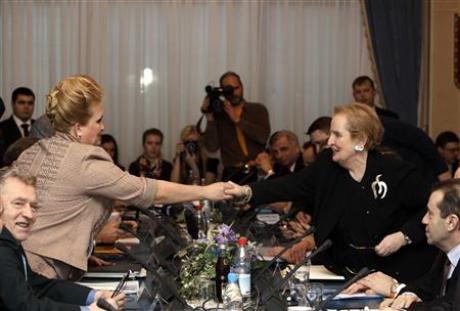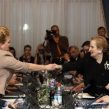
Russia’s Military Doctrine: New Dangers Appear
Publication: Eurasia Daily Monitor Volume: 7 Issue: 35
By:

In the immediate aftermath of President Dmitry Medvedev signing the new Russian military doctrine most attention focused on the fact that a first preemptive nuclear strike was not mentioned in the document and on the attention given to NATO as the chief source of “danger” to the security of the Russian Federation. Comments by NATO’s leadership that the doctrine was not a realistic portrayal of NATO were reported by the press, but there was no strong criticism of that aspect of the doctrine. Instead, Russian authors drew attention to the gap between Russia’s conventional military capabilities vis-a-vis NATO and its reliance on nuclear weapons in a conventional conflict.
Oleg Nikiforov, however, addressed the issue of NATO-Russian relations and explored Western assessments of Russia’s military power in a review of a recent article by Margarete Klein for the German Stiftung Wissenschaft und Politik. Klein had opined that Russia’s great power pretensions are not based on real military capabilities and that economic and demographic problems mean that it is unlikely to achieve military modernization. Nikiforov notes the prominence of the think tank and its close relationship to Chancellor Angela Merkel’s government. For Nikiforov, the article asked whether Russia is a “paper tiger or a real threat,” and answered with a qualified both. Russia’s military modernization will not pose a direct threat to NATO members, but its increased capabilities might permit it to more effectively intervene in its periphery, where it will be a real threat to successor states and with it the possibility of NATO intervention. In this regard, the Russian-Georgian conflict in 2008 appears to be a sign of the willingness of the Russian government to act even at the risk of creating an international crisis. He also notes her negative prognosis on the likelihood of success for the “new look” of the Russian armed forces, based upon the inability of their defense industry to produce modern weapons in a timely fashion, which leaves the prospect of conflict high and the ability to manage it at a conventional level low (Nezavisimoe Voennoe Obozrenie, February 5).
Olga Bozheva noted that the doctrine appeared on the eve of the Munich Conference on Global and European Security and created quite a stir. There, Russia raised concerns about US plans to deploy elements of an Anti Ballistic Missile (ABM) system in Romania, while the West expressed concern over the role of nuclear weapons in the Russian military doctrine. Citing reduced capabilities of early warning in the event of a nuclear attack and declining offensive nuclear capabilities, Bozheva depicted the doctrine’s nuclear pronouncements as a de facto admission of Russian military weakness. The doctrine offers nothing but fine words about the “new look” of the armed forces promised by Defense Minister Anatoliy Serdyukov, and Western leaders are likely to read the Russian defense posture as nothing more than a bluff seeking to conceal real weakness. The bluff will not work for long. Similarly, the new doctrine proclaimed NATO expansion to be the primary danger to Russian security, and the president approved the decision to purchase one helicopter amphibious assault ship of the Mistral class from France. This contradiction revealed the deeper problem of Russian defense, the absence of a “machine-building complex” to support domestic military requirements. Bozheva labeled the new military doctrine as an “anti-military doctrine” (Moskovsky Komsomolets, February 8).
Aleksandr Khramchikhin, the Deputy Director of the Institute for Political and Military Analysis, highlighted the potential for conflict on the Russian border, which had nothing to do with NATO, but was likely, if unleashed, to lead to a much wider war. Khramchikhin pointed to increased tensions between the Republic of Korea and the Democratic People’s Republic of Korea. He warned that neither Seoul nor Pyongyang, and neither Beijing nor Washington wanted to start a conflict, but the large arsenals and the heightened tension might lead to an uncontrolled escalation bringing in other powers. Khramchikhin, who has written extensively over the last few years on China’s emergence as a regional superpower and modern military power, notes a basic asymmetry between the armed forces of the North and South, with the latter enjoying technological superiority but the North prepared to conduct a dogged defense. US intervention on the side of South Korea would not fundamentally change that military balance, or bring the war to a rapid conclusion. US forces are currently overcommitted in other theaters and lack the strategic reserve to occupy the North. Khramchikhin characterized such a conflict as a catastrophe for everyone. Moreover, North Korea could make use of it nuclear arms delivered by short-range missiles and aircraft or as nuclear mines. Such an escalation would demand that China acted (Nezavisimoe Voennoe Obozrenie, February 4).
Only one week after Khramchikhin’s article, a group of “NATO Elders,” tasked with developing NATO’s new strategic concept visited Moscow. The group headed by the former US Secretary of State Madeleine Albright, stated that they were there to listen. They showed considerable interest in Russia’s new military doctrine and took several opportunities to remind Russian audiences of the challenge that China posed for international stability. The elders pointed out that the new military doctrine did not even mention China, while naming NATO’s expansion into post-Soviet space as the primary danger for Russian security interests. Russian specialists explained these remarks as a result of the increased tension between Washington and Beijing after the United States announced the sale of F-16’s to Taiwan, and characterized the new relationship as a “cold war” (Nezavisimaya Gazeta, February 12).
The silence about the rise of China and its implications for Moscow has been deafening. Sino-Russian cooperation to counter-balance a US-dominated unipolar order made some strategic sense when tensions between the United States and China did not look like they carried any risk of conflict. However, Russian observers now see the new tensions as the emergence of a “duel” between China and the United States for leadership. Thus far, there is no significant risk that the two powers will come to blows, it is clear that they are heading towards cooler relations with Beijing responding to the announced arms sale by cutting military-to-military contacts and threatening sanctions against the American firms involved in such sales to Taiwan. Vladimir Kuzar presented these tensions as marking the end of the mutually advantageous economic partnership between Washington and China, as Beijing asserts its regional power and seeks its own solutions to global issues like Iran and North Korea. He concludes his article by warning that the Sino-American duel “can create new and dangerous tension in world politics.” Yet, he does not address the implications of those dangers for Russia’s own security (Krasnaya Zvezda, February 10).




